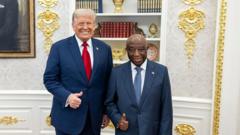In a move that intensifies U.S.-Brazil relations, President Trump announced plans for 50% tariffs on Brazilian imports, alleging a 'witch hunt' against former President Bolsonaro as his legal issues escalate.
Rising Tensions: Trump Threatens Brazil with Heavy Tariffs Amid Bolsonaro's Legal Troubles

Rising Tensions: Trump Threatens Brazil with Heavy Tariffs Amid Bolsonaro's Legal Troubles
Former President Trump seeks to retaliate against Brazil's treatment of Jair Bolsonaro, proposing sweeping 50% tariffs on Brazilian imports by August.
Amid escalating diplomatic tensions, former President Donald Trump declared on Wednesday his intention to levy a 50 percent tariff on all imports from Brazil. This action, set to take effect on August 1, is a response to what Trump perceives as an unjust treatment of Jair Bolsonaro, the former Brazilian president facing trial for alleged coup attempts following his 2022 election defeat.
In a strongly-worded letter addressed to Brazilian President Luiz Inácio Lula da Silva, Trump characterized Brazil’s handling of Bolsonaro as a significant "international disgrace." The tariff proposal comes amidst a backdrop of a $650 million trade surplus for the U.S. in its first quarter with Brazil, according to the American Chamber of Commerce.
Trump's recent remarks suggest a concerted effort to intervene diplomatically through economic means, remarking that the tariffs are essential to “rectify the grave injustices” of Bolsonaro's situation. This decision is reflective of Trump's broader strategy of utilizing tariffs as leverage in international political scenarios.
The tensions have been further exacerbated as Trump publicly condemned the criminal proceedings against Bolsonaro, which stem from the former president’s attempts to cling to power post-election loss. Each pronouncement not only highlights the political affiliations between the two leaders but also underscores the potential repercussions for trade relations.
As the date for the implementation of these tariffs approaches, it remains to be seen how Brazil will respond and what effects this could have on bilateral trade, particularly with the two nations engaged in approximately $20 billion worth of trade annually.




















